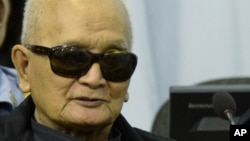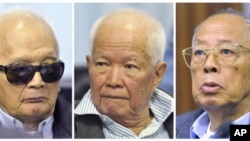PHNOM PENH —
The United Nations-backed tribunal investigating Cambodia's murderous Khmer Rouge movement was forced to cancel its hearings last week after two of the three defendants were taken to the hospital. The latest health scares have renewed fears about the case against the accused, all of whom are in their 80s.
Eighty-six-year-old Nuon Chea was taken to a Phnom Penh hospital January 13 after he collapsed at the tribunal’s detention facility. Nuon Chea, who is regarded as the Khmer Rouge’s chief ideologue, is being treated for acute bronchitis.
Three days later, the former head of state, Khieu Samphan, who at 81 is the youngest defendant, was taken to the same hospital suffering from fatigue and shortness of breath.
Both men have waived their right to be present in court. In their absence, the tribunal is hearing arguments about which documents the prosecution and the defense wish to introduce as evidence.
On Monday, the court asked Nuon Chea’s international defense lawyer, Victor Koppe, for an update on the condition of his client.
“The health situation is deteriorating though - so that’s troublesome - but there’s no change in respect to the waiver issue," he said.
The third defendant, former foreign minister Ieng Sary, who is 87, remains at the detention facility. Ieng Sary is widely seen as the most frail of the accused.
The age of the three has long been a major concern, and January’s health scares have reignited fears that one or more of the men might die during trial.
Anne Heindel, a legal adviser with the Documentation Center of Cambodia, the country’s leading genocide research organization, said, "Well, this is of major significance because all three accused are elderly and have health concerns, and there are only three accused in this trial and now two are in the hospital.”
The three are the surviving leaders of the Khmer Rouge, the Communist movement headed by Pol Pot that ruled Cambodia between 1975 and 1979. In that time an estimated two million people - or one in four Cambodians - died from execution, starvation, illness or overwork.
Heindel says the trial represents the only chance to hold the leadership of the Khmer Rouge to account.
"However, the fewer accused that you have and the less crimes that are discussed during a trial, and certainly if judgment’s never reached, then the opportunity to tell a story about crimes during a particular period gets smaller and smaller," she said.
The case against the ex-leaders already has lost one defendant. Late last year, 80-year-old Ieng Thirith, the former social affairs minister, was ruled mentally unfit to stand trial. She is believed to have Alzheimer’s disease.
The defendants all deny charges of genocide, war crimes and crimes against humanity. Given the complexity of the case, the age of the defendants and their health, the tribunal divided it into a series of smaller trials to run consecutively.
That means in theory the court could hand down judgments as it proceeds. In so doing, it would reduce the risk that one or more of the defendants died without a ruling being issued - as happened at the trial of the former Serbian president Slobodan Milosevic. Defendants who die before judgment is rendered cannot be convicted.
The first mini-trial, which is ongoing, got under way in late 2011. It is examining the alleged crimes against humanity in the forced movement of people in 1975 during which the prosecution says thousands died.
Other crimes on the charge sheet - including genocide, war crimes, collectivization, forced labor camps and slavery - are meant to be tackled in the subsequent mini-trials.
Heindel says it looks increasingly likely that this first mini-trial will take the rest of the year. Few observers believe the second, third or fourth mini-trials ever will be heard.
"It’s extraordinarily unlikely - and has been seen as unlikely even before these recent health concerns were raised - that there would be additional trials. So it’s looking more and more remote that these accused will ever be prosecuted for some of the most pressing crimes of that era - meaning those that survivors remember and feel the most distressed about," said Heindel.
This month’s health scares have highlighted a pressing question: whether all three defendants will even live long enough to hear judgment handed down in their first mini-trial.
Eighty-six-year-old Nuon Chea was taken to a Phnom Penh hospital January 13 after he collapsed at the tribunal’s detention facility. Nuon Chea, who is regarded as the Khmer Rouge’s chief ideologue, is being treated for acute bronchitis.
Three days later, the former head of state, Khieu Samphan, who at 81 is the youngest defendant, was taken to the same hospital suffering from fatigue and shortness of breath.
Both men have waived their right to be present in court. In their absence, the tribunal is hearing arguments about which documents the prosecution and the defense wish to introduce as evidence.
On Monday, the court asked Nuon Chea’s international defense lawyer, Victor Koppe, for an update on the condition of his client.
“The health situation is deteriorating though - so that’s troublesome - but there’s no change in respect to the waiver issue," he said.
The third defendant, former foreign minister Ieng Sary, who is 87, remains at the detention facility. Ieng Sary is widely seen as the most frail of the accused.
The age of the three has long been a major concern, and January’s health scares have reignited fears that one or more of the men might die during trial.
Anne Heindel, a legal adviser with the Documentation Center of Cambodia, the country’s leading genocide research organization, said, "Well, this is of major significance because all three accused are elderly and have health concerns, and there are only three accused in this trial and now two are in the hospital.”
The three are the surviving leaders of the Khmer Rouge, the Communist movement headed by Pol Pot that ruled Cambodia between 1975 and 1979. In that time an estimated two million people - or one in four Cambodians - died from execution, starvation, illness or overwork.
Heindel says the trial represents the only chance to hold the leadership of the Khmer Rouge to account.
"However, the fewer accused that you have and the less crimes that are discussed during a trial, and certainly if judgment’s never reached, then the opportunity to tell a story about crimes during a particular period gets smaller and smaller," she said.
The case against the ex-leaders already has lost one defendant. Late last year, 80-year-old Ieng Thirith, the former social affairs minister, was ruled mentally unfit to stand trial. She is believed to have Alzheimer’s disease.
The defendants all deny charges of genocide, war crimes and crimes against humanity. Given the complexity of the case, the age of the defendants and their health, the tribunal divided it into a series of smaller trials to run consecutively.
That means in theory the court could hand down judgments as it proceeds. In so doing, it would reduce the risk that one or more of the defendants died without a ruling being issued - as happened at the trial of the former Serbian president Slobodan Milosevic. Defendants who die before judgment is rendered cannot be convicted.
The first mini-trial, which is ongoing, got under way in late 2011. It is examining the alleged crimes against humanity in the forced movement of people in 1975 during which the prosecution says thousands died.
Other crimes on the charge sheet - including genocide, war crimes, collectivization, forced labor camps and slavery - are meant to be tackled in the subsequent mini-trials.
Heindel says it looks increasingly likely that this first mini-trial will take the rest of the year. Few observers believe the second, third or fourth mini-trials ever will be heard.
"It’s extraordinarily unlikely - and has been seen as unlikely even before these recent health concerns were raised - that there would be additional trials. So it’s looking more and more remote that these accused will ever be prosecuted for some of the most pressing crimes of that era - meaning those that survivors remember and feel the most distressed about," said Heindel.
This month’s health scares have highlighted a pressing question: whether all three defendants will even live long enough to hear judgment handed down in their first mini-trial.









